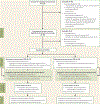Theta-Burst Transcranial Magnetic Stimulation for Posttraumatic Stress Disorder
- PMID: 31230462
- PMCID: PMC6824981
- DOI: 10.1176/appi.ajp.2019.18101160
Theta-Burst Transcranial Magnetic Stimulation for Posttraumatic Stress Disorder
Abstract
Objective: Posttraumatic stress disorder (PTSD) is a highly prevalent psychiatric disorder associated with disruption in social and occupational function. Transcranial magnetic stimulation (TMS) represents a novel approach to PTSD, and intermittent theta-burst stimulation (iTBS) is a new, more rapid administration protocol with data supporting efficacy in depression. The authors conducted a sham-controlled study of iTBS for PTSD.
Methods: Fifty veterans with PTSD received 10 days of sham-controlled iTBS (1,800 pulses/day), followed by 10 unblinded sessions. Primary outcome measures included acceptability (retention rates), changes in PTSD symptoms (clinician- and self-rated), quality of life, social and occupational function, and depression, obtained at the end of 2 weeks; analysis of variance was used to compare active with sham stimulation. Secondary outcomes were evaluated 1 month after treatment, using mixed-model analyses. Resting-state functional MRI was acquired at pretreatment baseline on an eligible subset of participants (N=26) to identify response predictors.
Results: Retention was high, side effects were consistent with standard TMS, and blinding was successful. At 2 weeks, active iTBS was significantly associated with improved social and occupational function (Cohen's d=0.39); depression was improved with iTBS compared with the sham treatment (d=-0.45), but the difference fell short of significance, and moderate nonsignificant effect sizes were observed on self-reported PTSD symptoms (d=-0.34). One-month outcomes, which incorporated data from the unblinded phase of the study, indicated superiority of active iTBS on clinician- and self-rated PTSD symptoms (d=-0.74 and -0.63, respectively), depression (d=-0.47), and social and occupational function (d=0.93) (all significant). Neuroimaging indicated that clinical improvement was significantly predicted by stronger (greater positive) connectivity within the default mode network and by anticorrelated (greater negative) cross-network connectivity.
Conclusions: iTBS appears to be a promising new treatment for PTSD. Most clinical improvements from stimulation occurred early, which suggests a need for further investigation of optimal iTBS time course and duration. Consistent with previous neuroimaging studies of TMS, default mode network connectivity played an important role in response prediction.
Trial registration: ClinicalTrials.gov NCT02769312.
Keywords: Brain Imaging Techniques; Posttraumatic Stress Disorder; Theta Burst Stimulation; Transcranial Magnetic Stimulation.
Conflict of interest statement
DISCLOSURES
The authors report no biomedical conflicts of interest related to this work. Dr. Philip has received grant support from Neuronetics, Neosync and Janssen through clinical trial contracts, and has been an unpaid scientific advisory board member for Neuronetics. Other coauthors report no conflicts of interest.
Figures


Comment in
-
Targeting PTSD.Am J Psychiatry. 2019 Nov 1;176(11):894-896. doi: 10.1176/appi.ajp.2019.19080895. Am J Psychiatry. 2019. PMID: 31672041 No abstract available.
-
Comment on Theta-Burst Transcranial Magnetic Stimulation for Posttraumatic Stress Disorder.Am J Psychiatry. 2020 May 1;177(5):465-466. doi: 10.1176/appi.ajp.2019.19101052. Am J Psychiatry. 2020. PMID: 32354268 No abstract available.
-
Informing Further Research in the Use of Brain Stimulation in Psychiatric Disorders: Response to Syed and Smith.Am J Psychiatry. 2020 May 1;177(5):466-467. doi: 10.1176/appi.ajp.2019.19101052r. Am J Psychiatry. 2020. PMID: 32354271 No abstract available.
References
-
- Shalev A, Liberzon I, Marmar C. Post-Traumatic Stress Disorder. N Engl J Med 2017;376(25):2459–2469. - PubMed
-
- American Psychiatric Association. Diagnostic and Statistical Manual of Mental Disorders 5th ed. Washington, DC: American Psychiatric Association; 2013.
-
- Yehuda R, Hoge CW, McFarlane AC, et al. Post-traumatic stress disorder. Nat Rev Dis Primers 2015;1:15057. - PubMed
-
- Kessler RC. Posttraumatic stress disorder: the burden to the individual and to society. J Clin Psychiatry 2000;61(suppl 5):4–12. - PubMed
-
- Watts BV, Schnurr PP, Mayo L, Young-Xu Y, Weeks WB, Friedman MJ. Meta-analysis of the efficacy of treatments for posttraumatic stress disorder. J Clin Psychiatry 2013;74(6):e541–e550. - PubMed
Publication types
MeSH terms
Associated data
Grants and funding
LinkOut - more resources
Full Text Sources
Medical

